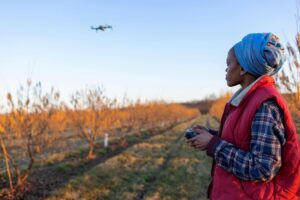How Nigeria Can Digitalize Agriculture
A revolution is happening across the globe. Not by Tesla or Apple. Not even Metaverse or AI, but in Agriculture. We are experiencing digitalization at its peak.
Plant analysis is now done almost instantly and crop protection has been handed over to robots. Even extension services no longer require physical contact, while sensors know when irrigation is due.
Digitalization is telling agriculture, “Hey, I’m here to stay.” As a result, agriculture has soared on a global scale, and it feels like we’ve gotten reinforcement in the war against hunger.
READ ALSO: BBC, Betta Edu, and Her Ministry of Corruption, by Farooq A. Kperogi
Yet, within this swift tide of innovation, Nigeria, a nation spoiled with agricultural potential risks being left behind.
FAO’s worrying statistics don’t help matters; It states that only 27% of Nigerian farmers have access to the internet – a ridiculously low number for any form of digital development.
Yet, the International Telecommunication Union (ITU) records 87% of mobile cellular subscriptions among Nigerians, showing that we are no strangers to mobile technology.
But tragically, the potential in Nigerian agriculture from the perspective of digitalization remains untapped.
The consequences of this are not theoretical by any chance. Our food security is already hanging in the balance, with an estimated post-harvest loss of about 40%, according to some reports – thanks to insufficient storage facilities and transportation.
Meanwhile, poor access to information leaves farmers vulnerable to market fluctuations and unfair pricing.

Source: Stock
What is the way forward?
To avert these looming crises, Nigeria must take the baton from the other parts of the world already enjoying digital transformation.
In his remark about harnessing digital technologies for agriculture in Africa, Dr. Akinwumi A. Adesina, President of the African Development Bank Group, mentioned that “One area that is ripe for a radical transformation is how to use this digital revolution to unlock the vast potential in the continent’s agricultural value chains.
Investing in agriculture human capital – the skills and knowledge required to navigate the digital landscape – is the key to unlocking Nigeria’s agricultural potential.
This should encompass revamping the agriculture curriculum in institutions to include digital literacy, including code and non-code tech skills.
Other strategies to explore could be government-organizations-startup partnerships to train youths specifically on applying tech solutions in agriculture, while agribusinesses can train their staff on digital literacy.
However, improving agriculture human capital must not be confined to the Gen-Zs or startups alone. More than 70% of food production in Nigeria stems from the efforts of rural peasant farmers.
Ignoring them in enhancing the digitalization of agriculture through improving human capital means laying the bed for failure.
As digital solutions require receptive adopters to drive growth, exempting smallholder farmers places Nigeria in a situation where digital solutions may exist with little demand.

Source: iStock
When talking about improving agriculture human capital, Kenneth Obayuwana, CEO of Agritech Digest and Head of Food Security at Food and Agriculture Youth Institute said, “Focus on education and training programs that equip farmers with digital skills, promote technological adoption, and foster innovation in farming.”
He further advised that we must “emphasize the benefits of a tech-savvy agricultural workforce, such as increased productivity, sustainable practices, and improved market access.
This two-dimensional approach of catching up with global standards through agriculture human capital bridges the gap between the tech-savvy generation and the experienced farmers who hold the production power of the country.
Imagine farmers equipped with agricultural mobile apps accessing real-time weather data, market prices, and tailored pest control strategies. Data-driven irrigation systems are optimizing water usage.
AI-powered analytics informing planting decisions and maximizing yields. Better still, imagine rural farmers receiving training online from extension agents.
Benefits of Digitalized Agriculture in Nigeria
The potential in revolutionizing Nigerian agriculture with digital means is immense and holds the following benefits among a host of others:
- Improved Market Access and Transparency: Nigerian farmers can connect directly with buyers and consumers through digital platforms, bypassing traditional middlemen and reducing transaction costs. This gives them greater control over their pricing and improves market transparency.
- Resilience to Climate Change: Digital technologies can help Nigerian farmers to adapt to the challenges of climate change. For example, weather forecasting tools can help farmers prepare for extreme weather events, and drought-resistant crop varieties can be developed and disseminated more quickly using digital tools.
- Increased Productivity and Efficiency: Precision agriculture, drones, and AI-powered analytics can help Nigerian farmers optimize their resource use, improve yields, and reduce waste. This can lead to significant increases in productivity and efficiency, making Nigerian agriculture more competitive on the global market.

Source: iStock
The list is endless, the potential is immense, and the possibilities are scary. Nigeria is on a good trajectory with the number of tech-savvy youths increasing rapidly. All that is left is a little wave of the wand to incorporate these tech brains in the food sector.
Sooner or later, we may see a Nigeria that tops the chart of nations with a digitized agricultural sector. When that happens, we will bask in tales of triumph in the war against hunger.





